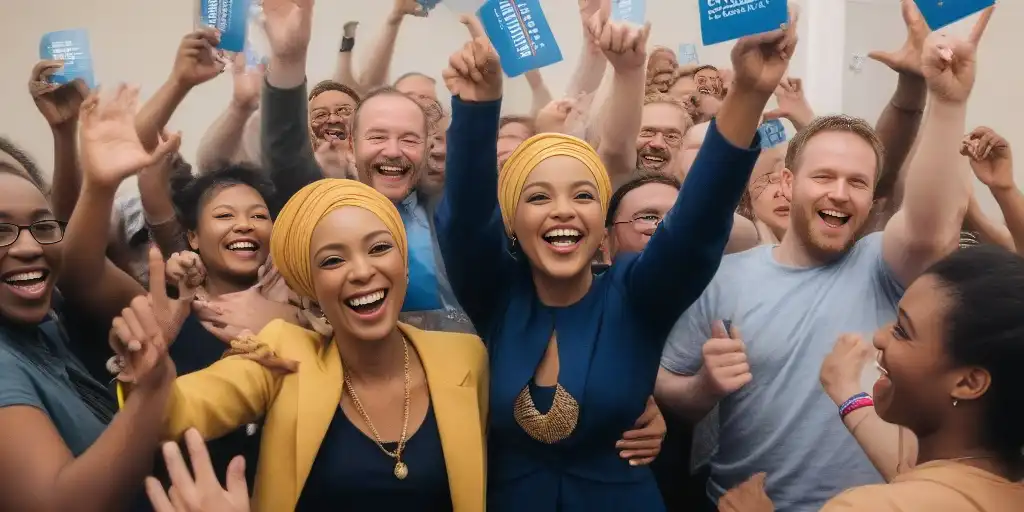Ilhan Omar Secures Primary Win Amidst 2024 Election Tensions

Rep. Ilhan Omar Triumphs in Minnesota Primary Amidst Heated Political Landscape
Rep. Ilhan Omar, a prominent member of the progressive “Squad” in the U.S. House of Representatives, successfully defended her seat in Minnesota’s 5th District during the recent primary elections. Known for her vocal criticism of Israel’s actions in Gaza, Omar managed to fend off a strong challenge from former Minneapolis City Council member Don Samuels. This victory underscores her continued influence and support within her constituency, despite facing significant opposition.
Omar’s victory comes at a time when other members of the progressive “Squad” have faced setbacks. Rep. Cori Bush lost her primary in Missouri, and Rep. Jamaal Bowman was defeated in New York. These losses were influenced by substantial financial efforts from the United Democracy Project, a super PAC linked to the American Israel Public Affairs Committee (AIPAC). Interestingly, this super PAC did not invest in the Minnesota race, potentially giving Omar a strategic advantage.
Omar’s Campaign Themes
A Message of Joy and Unity
In her victory speech, Omar echoed the themes of joy and community that have been central to her campaign. She emphasized the importance of fighting for neighbors and advocating for housing and healthcare as fundamental human rights. Her message resonated with many voters who share her vision of a peaceful and equitable world.
-
Advocacy for Human Rights:
- Housing as a human right.
- Healthcare as a human right.
- Vision for a peaceful and equitable world.
-
Community and Joy:
- Importance of fighting for neighbors.
- Politics of joy and unity.
Overcoming Criticism and Financial Disparity
Don Samuels, Omar’s primary opponent, criticized her stance on Israel and her divisive rhetoric. He also highlighted public safety concerns in Minneapolis, a city still grappling with the aftermath of George Floyd’s murder by a former police officer in 2020. Despite these criticisms, Omar’s campaign managed to out-raise and out-spend Samuels significantly, with Omar reporting $6.2 million in contributions compared to Samuels’ $1.4 million.
Republican Challenger and Other Key Races
Republican Dalia Al-Aqidi
Omar’s next challenge will be against Republican Dalia Al-Aqidi, an Iraqi American journalist and secular Muslim who has labeled Omar as pro-Hamas. This race is expected to be contentious, given the stark differences in their political views and backgrounds.
Royce White’s Unexpected Victory
In another surprising turn of events, conservative populist and former NBA player Royce White secured the Republican nomination to challenge Democratic U.S. Sen. Amy Klobuchar. White, an ally of controversial figures like Steve Bannon and Alex Jones, defeated Navy veteran Joe Fraser. His divisive rhetoric and controversial social media posts have drawn significant attention, but his victory demonstrates the shifting dynamics within the Republican Party.
Joe Teirab vs. Angie Craig
Former federal prosecutor Joe Teirab, backed by prominent Republicans including former President Donald Trump, will face Democratic Rep. Angie Craig in Minnesota’s 2nd District. This race is anticipated to be one of the most competitive in the state. Teirab’s opponent, defense attorney Tayler Rahm, had suspended his campaign but remained on the ballot, adding an additional layer of complexity to the primary.
Key Issues and Campaign Strategies
Public Safety and Social Justice
Public safety remains a critical issue in Minneapolis, especially in the wake of George Floyd’s murder. Both Omar and Samuels addressed this topic, albeit from different perspectives. Omar’s progressive approach focuses on systemic changes and community-based solutions, while Samuels emphasized traditional law-and-order policies.
Financial Resources and Campaign Spending
The financial disparity between candidates played a significant role in the primary outcomes. Omar’s substantial fundraising allowed her to mount a robust campaign, whereas Samuels struggled to compete financially. This trend was also evident in other races, highlighting the increasing importance of campaign funding in modern elections.
Legislative and Senate Races
High-Stakes State Senate Race
Former state Sen. Ann Johnson Stewart will face Republican Kathleen Fowke in a crucial state Senate race that could determine party control in Minnesota. This election is particularly significant as it will influence the state’s legislative agenda and the balance of power.
The Role of Endorsements
Endorsements from high-profile figures and organizations have been pivotal in these races. Joe Teirab received support from Trump and other Republican leaders, while Royce White’s association with Steve Bannon and Alex Jones shaped his campaign narrative. These endorsements often sway voters and can be decisive in closely contested races.
FAQs
What are the key issues Rep. Ilhan Omar focuses on?
Rep. Ilhan Omar advocates for housing and healthcare as human rights, social justice, and a peaceful, equitable world.
Who is Dalia Al-Aqidi?
Dalia Al-Aqidi is an Iraqi American journalist and secular Muslim running as the Republican challenger against Rep. Ilhan Omar.
What were the main criticisms against Rep. Ilhan Omar in the primary?
Omar faced criticism for her stance on Israel and her perceived divisive rhetoric, as well as public safety issues in Minneapolis.
How did campaign funding impact the primary races?
Campaign funding played a significant role, with candidates like Omar benefiting from substantial financial support, while others struggled due to limited resources.
Who will Royce White be challenging in the Senate race?
Royce White will challenge Democratic U.S. Sen. Amy Klobuchar in the upcoming election.
Conclusion
The recent primary elections in Minnesota have highlighted the dynamic and often contentious nature of modern American politics. Rep. Ilhan Omar’s victory underscores her continued influence and the support she enjoys within her district, despite facing significant challenges. As the general election approaches, the outcomes of these races will undoubtedly shape the political landscape in Minnesota and beyond. Key issues such as public safety, social justice, and campaign financing will remain at the forefront, influencing voter decisions and candidate strategies.
